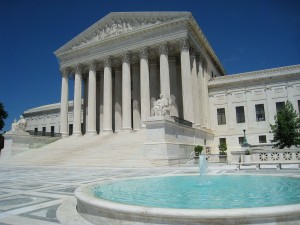Experienced Federal Crime Attorney: Professional Defense in Federal Crime Situations
Experienced Federal Crime Attorney: Professional Defense in Federal Crime Situations
Blog Article
Demystifying the Refine of Federal Appeals: What You Required to Know
Browsing the intricate realm of federal charms can usually seem like traversing uncharted waters for those not familiar with the process. Comprehending the subtleties of appellate court territory, the details of submitting a notification of appeal, presenting a compelling brief, and making a persuasive oral argument are essential parts that can significantly influence the result of a situation. By deciphering the layers of complexity surrounding federal appeals, individuals can gain a clearer understanding right into the systems that control this important phase of the lawful system.
Comprehending Federal Appeals Process
Looking into the intricate world of the government charms process unveils a structured and systematic trip with the judicial system. Federal appeals work as a crucial device for assessing choices made by lower courts. Understanding this procedure is necessary for any individual involved in lawful process at the government level.
The procedure normally begins with a party disappointed with a lower court's ruling submitting a notice of allure. This activates an evaluation by a greater court, where a panel of courts assesses the lawful disagreements presented by both events. Briefs describing the lawful reasoning behind each party's setting are sent, and dental arguments may be heard to clarify intricate issues.
The appellate court's choice is based upon a comprehensive assessment of the reduced court's procedures and the debates offered. The courts do not concentrate however reconsider truths on whether lawful errors happened that impacted the lower court's decision. Once the appellate court reaches a decision, it can attest, turn around, remand, or change the reduced court's judgment, supplying quality and finality to the lawful conflict. Comprehending this process is important for navigating the intricacies of government allures successfully.
Appellate Court Jurisdiction Clarified
Appellate court jurisdiction refers to the extent of cases that a certain appellate court has the power to make a decision and review upon. Unlike test courts that listen to situations for the initial time, appellate courts are limited to assessing decisions made by reduced courts.
Appellate courts have jurisdiction over certain sorts of cases, commonly those including lawful errors, procedural concerns, or inquiries of regulation rather than accurate disagreements. The jurisdiction of appellate courts is normally outlined in statutes and regulations that govern the court system. Comprehending appellate court territory is crucial for celebrations entailed in the appeals process as it establishes whether an instance is qualified for evaluation and the degree to which the appellate court can intervene in the reduced court's decision.
Filing a Notification of Appeal
The initial action in beginning the federal allures process includes filing a Notification of Allure with the ideal appellate court. This important file formally notifies the court and the other celebrations associated with the instance that the appealing event plans to look for a review of the lower court's decision. Filing a Notice of Appeal is a strict procedural requirement that sets the appellate process moving.
When preparing the Notification of Allure, it is essential to guarantee compliance with the particular guidelines and guidelines of the relevant appellate court. federal appeal attorneys. The file should generally include information such as the case name, the reduced court's name, the day of the judgment being appealed, and a succinct statement indicating the grounds for the allure

Briefing and Oral Debate
In the appellate process, offering written briefs and taking part in dental arguments play essential duties in promoting for the appealing event's position before the appellate court. Briefs are comprehensive legal papers that lay out the parties' disagreements, lawful authorities, and analysis supporting their settings. These created submissions supply the court with a thorough understanding of the facts of the situation, the pertinent law, and why the appealing celebration thinks the reduced court's choice should be reversed.
Adhering to the entry and review of the briefs, dental debates supply the parties a chance to more clarify their placements, address any type of concerns the appellate courts might have, and emphasize vital points from their written briefs. Oral disagreements are an opportunity for the lawyers to persuade the judges through verbal advocacy and feedbacks to inquiries from the bench.
Both the written briefs and oral arguments are important elements of the appellate procedure, allowing parties to provide their situation thoroughly and compellingly before the appellate court. - federal crime lawyer
Obtaining the Appellate Court Choice
Upon conclusion of dental disagreements and submission of created briefs, the following essential phase in the appellate process involves awaiting the decisive judgment from the appellate court. This duration of anticipation can be filled with a mix of anxiety and expect events included in the charm. The appellate court's decision is usually delivered in a written layout and lays out the court's verdicts on the legal issues offered, the thinking behind their decision, and the judgment provided. The moment framework for getting the appellate court's decision can differ, however courts strive to provide prompt resolutions. When the decision is released, celebrations need to carefully assess the court's judgment to comprehend the result and determine any further actions that might be required. Whether the appellate court affirms, reverses, or remands the reduced court's choice, understanding the ramifications of the judgment is crucial for all events included in the appellate process. Get More Info Promptly reviewing and comprehending the appellate court's choice is necessary in browsing the next steps in the lawful proceedings.
Verdict
Comprehending the appellate court territory, filing a notice of charm, preparing briefs, and providing oral debates are all important elements of this process. Ultimately, receiving the appellate court decision can provide clarity and resolution to lawful disagreements.
As we proceed from recognizing the government charms process to dissecting the intricacies of appellate court jurisdiction, a fundamental element comes to light concerning the authority and limitations of these higher courts in the lawful landscape. Appellate court territory refers to the range of situations that a particular appellate court has the power to review and decide upon. Unlike trial courts that hear instances for the very first time, appellate courts are limited to reviewing choices made by reduced courts. Comprehending appellate court jurisdiction is crucial for events included in the appeals procedure as it figures out whether a case is qualified for evaluation and the extent to which the appellate court can interfere in the lower court's decision.

Report this page